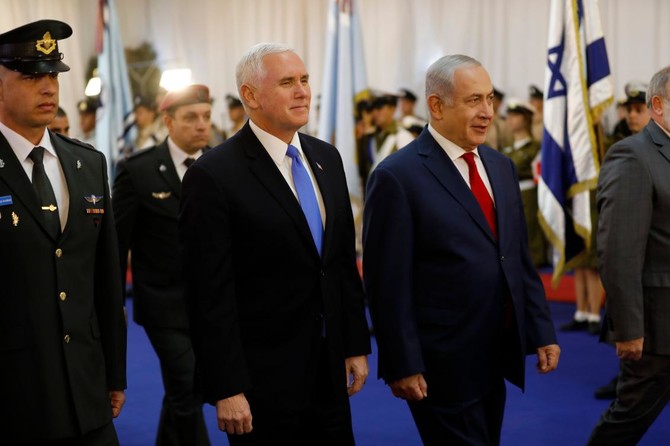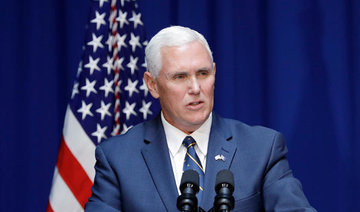JERUSALEM: US Vice President Mike Pence pointedly referred to Jerusalem as Israel’s capital on Monday and said the US embassy would open there by next year, as he met the country’s leader, further vexing Palestinians who have already snubbed his visit over a US policy shift toward the holy city. And Pence urged Palestine to rejoin the peace talks.
President Donald Trump last month acknowledged Jerusalem as the capital of Israel and said he would move the US embassy there — dismaying Palestinians who claim the eastern part of the city and angering Arab states across the region.
Pence, who is part-way through an official visit to the Middle East, said in Egypt on Saturday and again in Jordan on Sunday that Washington would support a two-state solution for Israelis and Palestinians if they both agreed to it.
On Monday he said he was honored to be “in Israel’s capital, Jerusalem” at the start of talks with Prime Minister Benjamin Netanyahu.
Echoing that sentiment, Netanyahu told the vice president. “This is the first time that I stand here where both leaders can say those three words: ‘Israel’s capital Jerusalem.’“
Pence said Trump’s declaration, which most of America’s main allies beyond the Middle East have also criticized, provided new opportunities for Israeli-Palestinian peace.
“I also am here hopeful that we are at the dawn of a new era of renewed discussions to achieve a peaceful resolution to the decades-long conflict that has affected this region,” Pence said.
Palestinian President Mahmoud Abbas, who has called the declaration a “slap in the face,” left for an overseas visit before the vice president’s arrival.
“The American recognition of Jerusalem as Israel’s capital and the occupation are illegitimate. The American administration must not contribute to escalating the situation further,” said Nabil Abu Rdainah, a spokesman for Abbas, after Pence’s remarks.
Palestinians want East Jerusalem, including the walled Old City with its holy sites, as capital of their own future state.
Israel, which annexed East Jerusalem after capturing it in 1967 in a move not internationally recognized, regards all of the city as its “eternal and indivisible capital.”
NO PALESTINIAN TRIPS
Pence, an evangelical Christian who has been vocal on the subject of protecting Christians in the Middle East, is not scheduled to make any private trips to Palestinian areas such as Bethlehem, a city whose Christian significance usually draws Western dignitaries.
US officials have said an embassy move from Tel Aviv could take up to three years. But there has been speculation that Pence could announce a stop-gap arrangement, such as the conversion of one of the US consulate buildings in Jerusalem to a de facto embassy.
“Will you do it by next year?” Pence and Netanyahu were asked by a reporter about an embassy move.
“We’ll do it next week,” Netanyahu responded jokingly. Pressed on whether he was serious, Netanyahu said he was not, but added, “We want to do it.”
Netanyahu has said he expected at least an interim arrangement to go into effect very soon, perhaps within a year.
Trump has made no firm public commitment on timing.
With the Palestinians boycotting Pence, his visit provides little obvious opportunity to build bridges toward peace.
But it gave Pence and Netanyahu, a right-winger who has hailed US evangelicals for their support of Israel, an opportunity to highlight their own warm relationship for a conservative American Christian community that serves as a power base for Trump and his vice president.
Later on Monday, Pence will address the Israeli parliament, whose Arab members said they would boycott the event. On Tuesday, he will attend Judaism’s Western Wall in Jerusalem and lay a wreath at the Yad Vashem Holocaust remembrance center in the city.

























